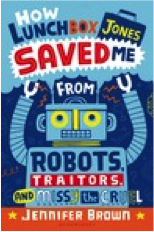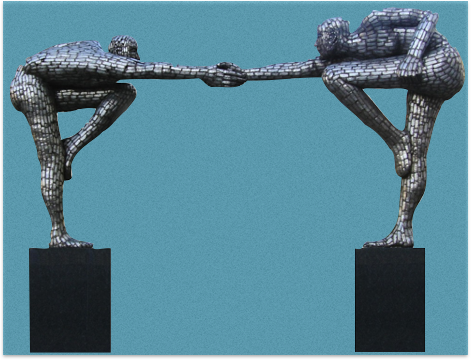by Gail Pritchard, PhD, The University of Arizona
“Things are never quite as scary when you’ve got a best friend” (Bill Watterson).
If you Google “unlikely friendships,” you will find books, YouTube videos, and images of unusual animal friendships. These tend to be animals from different species and even those that would be considered natural enemies, like a bonded cat and bird. But what do we mean when we refer to people with unlikely friendships? Generally, those friendships are between people who appear to be very different—it might be due to personality traits, values, points of view, age, income, language, culture, education…. It may simply be a case of “opposites attract.” Let’s think about some cases in point. UrbanTimes has piece on unlikely friendships in film and TV; here are some of those highlighted friendships: Woody and Buzz from the Toy Story franchise, Chuck and Wilson from Cast Away (a friendship style picked up on in the new TV series Last Man on Earth), Zack and Screech from Saved by the Bell, Marlin and Dory from Finding Nemo, Sherlock and John from the made-for-TV movie series Sherlock, Bruno and Shmuel from The Boy in the Striped Pyjamas, Remy and Linguini from Ratatouille—in each of these cases, these unlikely friends find a common ground where they develop deep friendships, often leaning on each during times of trouble. In the books reviewed this week, unlikely friendships have developed and flourished in unexpected ways.
 Gantos, J. (2011). Dead End in Norvelt. NY, NY: Farrar, Strauss, and Giroux, 352 pp.
Gantos, J. (2011). Dead End in Norvelt. NY, NY: Farrar, Strauss, and Giroux, 352 pp.
In this 2012 Newberry Medal winner described as “brilliant” by Dave Barry and “a bit of autobiography” by Publishers Weekly, we meet twelve-year-old Jackie Gantos just as his summer is beginning. It starts off, literally, with a bang, when Jack decides to shoot his dad’s sniper rifle, not realizing it is loaded. Soon after, his dad has him mow down his mother’s corn, but it is Jack that ends up getting “grounded for life”. With the summer ahead of him and nothing to look forward to, Jack is allowed one reprieve– helping old Miss Volker, the local historian, medical examiner, and writer of obituaries. Jack and Miss Volker find common ground over their love of history—one of Jack’s interests is reading history books and “Miss Volker makes meaning out of historical events… she helps the townspeople find the lessons they should draw.” Through his daily interactions with Miss Volker, Jack learns the value of honesty and the importance of social responsibility, and together–they solve a series of murders in their small town of Norvelt. Luckily for readers, the adventure and friendship continues in the sequel, From Norvelt to Nowhere.
 O’Porter, D. (2014). Paper Airplanes. NY, NY: Harry N. Abrams. 272 pp.
O’Porter, D. (2014). Paper Airplanes. NY, NY: Harry N. Abrams. 272 pp.
While this is O’Porter’s first novel, she has a well-established writing career and her own history as a teenager to draw upon in this wickedly funny story about Flo and Renée. O’Porter uses her own diaries as inspiration for what makes a friendship good and what makes it bad, and what makes Flo and Renée’s friendship unusual is the stark differences in their personalities. Flo is the ‘’good girl” who is studious, follows the rules, and is reflective; Renée is the polar opposite—a wild child. As with many unlikely friendships, these two bond during a time of trouble—Flo’s parents have split, her “best” friend, as it turns out–is not so much; Renée puts it this way, “You have to be a certain kind of person to know how to be that much of a bitch at seven years old. I honestly think that Sally Du Purtron is pure evil. She isn’t nice to anyone, especially her best friend Flo Parrot. Who, to be fair, must be a bit of twat to put up with it” (p. 9). Renée has her own issues. Since her mother’s death, she and her sister have lived with her grandparents who are unable to acknowledge their own grief, much less support Renée and her bulimic sister’s. This edgy read untangles the many knots of complicated friendships and the difficulties adolescent girls encounter. Jamie Lee Curtis says Paper Airplanes “is brutal and beautiful, flawed and forgiving . . . ”. I have to agree—O’Porter offers an “I-can’t-put-this-down-till-I’m-finished” read that will have you eager to read its sequel, Goose.
 Brown, J. (2015). How Lunchbox Jones Saved Me from Robots, Traitors, and Missy the Cruel. NY, NY: Bloomsbury, 240 pp.
Brown, J. (2015). How Lunchbox Jones Saved Me from Robots, Traitors, and Missy the Cruel. NY, NY: Bloomsbury, 240 pp.
Jennifer Brown, known for her young adult novels and her quirky, humorous middle school novel, Life on Earth, writes about another unlikely friendship in How Lunchbox Jones Saved Me from Robots, Traitors, and Missy the Cruel. Luke attends Forest Shade Middle School—a school where the mascot “was frequently found sitting in a rocking lawn chair knitting toilet–paper-roll covers” and they “hadn’t won a game in pretty much as long as anyone could remember. In any sport. Not a single one” (p. 1). Against the backdrop of “the losing-est middle school ever in the history of middle schools” (p. 2), we meet seventh-grader, Luke Abbott who is feeling betrayed by his older brother’s enlistment in the Marines. “’You’re going to have to forgive him sometime, Luke,’ Dad said. I stopped. ‘No, I won’t.’ ‘Yes, you will. He’s your brother. And he’ll be going off to boot camp in May’” (p. 6); but for Luke, Rob’s impending departure is the ultimate betrayal.
Luke suddenly finds himself part of a mismatched robotics team when his teacher approaches his dad about joining. His team’s personalities, points of view, and experiences couldn’t be any more different: Mikayla Armitage, “normal looking seventh grader by day; toe prodigy by night” (p. 39). Jacob and Jacob, who are not twins. “We’re not related at all,’ the other one said. ‘My last name is Davis.’ ‘And mine is David. Big difference’” (p. 40). Stuart Hicks who “ate what seemed to be an endless supply of sunflower seeds out of his jacket pocket” (p. 41). Missy Farnham, also known as Missy the Cruel with “the voice that had poured ice water through my veins since I was six years old . . . She was, to me, a rabbit-eating ogre. She was, to the rest of the world, adorable” (pp. 42-43). Lunchbox Jones who “carried a blue plastic lunchbox everywhere he went and he was pretty much always in trouble for something nobody ever saw. And that he was Scary. Really, really scary” (p. 17). In trying to break their school’s abysmal losing record, Luke, Mikayla, Jacob and Jacob, Stuart, Missy the Cruel, and Lunchbox Jones forge an unlikely team and bond—learning a little bit about robots, a little bit more about life, and a whole lot about what it means to be a friend.
Please visit wowlit.org to browse or search our growing database of books, to read one of our two on-line journals, or to learn more about our mission.
- Themes: T. Gail Pritchard
- Descriptors: Books & Resources, WOW Currents

